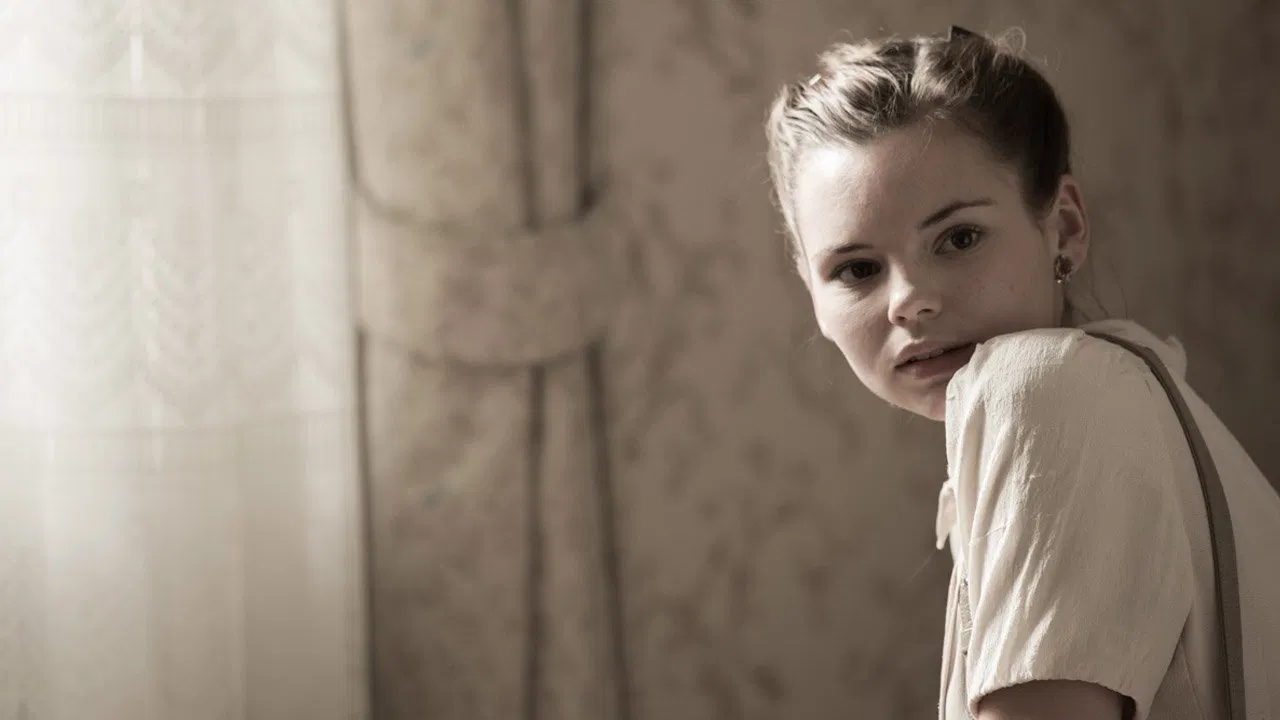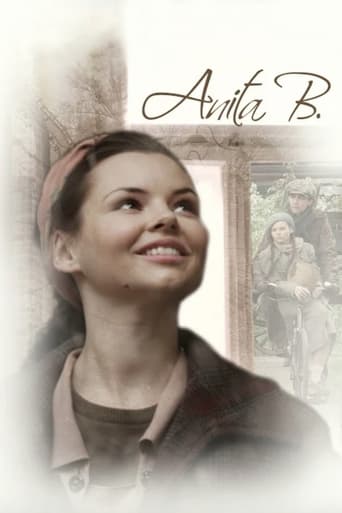

***Contains Spoilers***Anita B is a movie focusing on a young girl recently freed from a Jewish concentration camp immediately after World War II. Anita is first introduced to the audience as shocked, confused and slightly lost. When we first meet her, she is starving and her hair is matted, thinning and very short. The movie follows Anita as she falls in and out of love, meets friends and searches to discover herself in the picturesque 1940's Czech Republic backdrop. Anita shows how difficult and trying life was for Jews in Eastern Europe directly following World War II, including the sacrifices and triumphs she discovers along the way. The movie reflects 20th century Eastern Europe through displaying beautiful, serene landscapes and panoramic city views. The film is slightly under saturated and sepia, adding to its antique quality, reminiscent of old family photographs. The film is also shot in very beautiful, artistic ways that make the movie consistently aesthetically appealing to the audience. The actors are very good in this film, portraying characters that were lovable at times, and unlikable at others, creating a realistic family dynamic which the audience could relate to. I particularly enjoyed Anita's transformation throughout the movie. She began as a lost character that was defined by the legal papers stating her citizenship. Through the movie, she grew as a person, and at one point even gained confidence in realizing that she was Anita, with or without the papers. Anita begins to make a life for herself in her Aunt's house, raising her cousin, Robbie and falling in love with her roommate, Eli. Anita's presence in the household is somewhat inconvenient and undesired on Anita's aunt's behalf. Anita seeks Robbie out as an outlet for her stories of the concentration camps, having no alternate person to turn to, but is ultimately able to befriend a fellow worker in her factory once she gets a job. The character of Anita is very likable, as the young girl has obviously gone through traumatic experiences yet is still able to find joy in life. Her ability to take life lightly and have fun despite her circumstances sends a message of hope to the viewers, and serves as a foreshadowing for the future: that life will go on after the war. I liked the balance between the darker scenes, dealing with heavy emotional material such as when Anita is arrested for being caught outside as a Hungarian without her papers, to the lighter scenes where Anita feels freer, such as when she visits Eli's horse or the ending of the movie, when she acknowledges the impending happy future she will find in Palestine. Anita's character is relatable in her journey to self-discovery as a young girl and also admirable as she faces things that most Western viewers are alien to in this century. The movie depicts grave, heavy subjects yet is able to balance them out with happy scenes, and all while keeping an interesting plot to engage the viewer.
... View MoreThe film, Anita B., directed by Roberto Faenza and based on Edith Bruck's novel, Quanta Stella Cè' Nel Cielo, shares the story of Anita, a young Hungarian Jewish girl who survived Auschwitz. The film follows Anita as she experiences a different type of isolation and confinement in the home of her Aunt Monika, in the Czechoslovakian town of Zvikovez. While Monika, Monika's husband, and her husband's younger brother, Eli, all strive to erase all memories of the past few years from their minds, Anita resolves to never forget anything, particularly memories of her parents, who were killed in front of her at Auschwitz. Anita is also restricted to Monika's apartment for months because she lacks the proper documentation to live in Czechoslovakia. Despite this confinement, Anita proves herself to be both creative and true explorer through the scenes she paints on her baby nephew's walls, journeying, and in the few times that she ventures out of the house. Indeed, Anita spends much time telling stories form her life to her small nephew. However, Anita's sense of self is challenged by her romantic relationship with Eli. Their relationship climaxes when Anita discovers that she is pregnant. Despite Anita's wishes, Eli forces her to go to Prague to have an abortion. However, the doctor in Prague realizes that Anita wants to keep her baby and does not perform the operation and instead gives her his doctor's fee. The doctor's protection and support of her choices seems to ignite Anita's confidence and motivation: she runs away from Eli and searches out a friend in Prague who acts as a 'ferrywoman' for refugees who wish to travel to Palestine. The film ends as Anita travels to Palestine, describing her passage as "a journey to the past with only one piece of baggage: the future".Anita B. is one of the few films that examines the aftermath of the Holocaust, relative to the numerous films that take place during the Holocaust. While watching the threads of the story weave together, one finds oneself entranced by the smallest gestures, micro-expressions, and awkward conversations of the characters. These exceptionally human interactions bring a humble truth to the film. The breathtaking cinematography, thoughtful performance by the actors and actresses, and articulate screenplay pull the viewer into the heart of the story and force the viewer to perform a certain level of introspection. Indeed, the poetic last line of the film not only serves as the realization of Anita's independence and courage as a human being and also as a woman but also speaks to the responsibility the viewer of the film, as a participant of the story. More specifically, the viewer's responsibility as a witness of history; to remember, that as we move into the future, we must not allow the violations of human rights, loss of human life, and oppression of the holocaust to repeat again.
... View MoreI found Anita B. to be a very compelling movie. It deviated from the normal Holocaust narrative, choosing to focus on the survivors and those who did not want to remember. It portrayed the complexities and diversity in the way that victims deal with grief and trauma. It showed those who choose to forget and those who fought to remember. By choosing to not focus on the horrors of what actually happened in Auschwitz the movie depicts the unsettling idea that those who survived were not necessarily free. Being Jewish is still not something Monika is proud of. Surviving is not something Monika is proud of instead she is ashamed. This showing how surviving the Holocaust is just one small piece to an individual's recovery. There is so much grief and guilt that individuals dealt with because they survived while the people they loved were killed. Another aspect I found intriguing about the film was how Anita's caring for Rob foreshadowed her future of motherhood. I think that the relationship she builds with Roby throughout the film is important because it proves to the viewer, and to Anita herself, that she can handle motherhood. This is important because it also highlights her growing confidence and independence. Her pregnancy becomes a symbol of the future and the possibilities of the future. I think an interesting line in the film is when Eli says that he does not want to bring a child into this world, implying that this world is too evil for a child to have to suffer through. However, I think that Anita's child symbolizes something completely different: that another generation will come and that this generation won't know the pains of the Holocaust the way Anita does. Her child symbolizes a hope for the future and the possibility of a better future for all persons. The movie ends on a hopeful note. Anita sets out on a journey by herself, without a man. She has grown into the woman she wants to be and she has taken charge of her life. She is no longer afraid.
... View MoreI will start listing the good things I found in this movie: it transmits the passion that has been put in the making. It deals finely with the most delicate matter of the past Century: the genocide of six million Jews during World War II. It gives hope. On the other hand, however, it shows the (most irritating to me) lack of narrative depth that I so frequently find in modern Italian productions. What kind of audience could find convincing a woman saying to a girl she just met 'the best way to explain to you what love means is playing this melody on the piano'? And people who hurt other people, why would do they do that? We are not given an explanation of their behavior, not a hint. Should we believe that they are just born different from the others, that mankind could be divided into those who keep smiling (the good ones), those who never do (the bad ones) and those who sneer (the deceiving ones)? I hate it when the script requires me a leap of faith to believe the story.I have my own theory: I think Italian cinema has reached an all-time low and people by now are so used to bad films that good Authors (like the present ones) do not feel anymore the need for a really good production, starting from a sound screenplay. I am Italian and I love movies. Nothing could please me more than watching beautiful Italian movies.
... View More